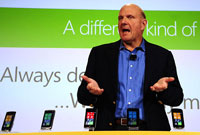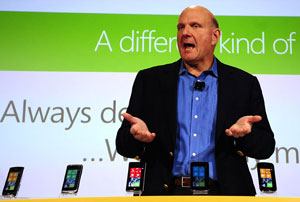No matter how much you love your smartphone, it can't reach its full potential unless software  developers like it too.
developers like it too.
That's the realization that has hit many BlackBerry owners in this brave new app-centric world. And when Microsoft's Windows Phone 7 hits the market in November, early adopters of that platform may find a similarly barren digital market at first.
No matter how much you love your smartphone, it can't reach its full potential unless software developers like it too.
That's the realization that has hit many BlackBerry owners in this brave new app-centric world. And when Microsoft's Windows Phone 7 hits the market in November, early adopters of that platform may find a similarly barren digital market at first.
The success of a new smartphone can depend on whether there are enough killer apps for it. That's up to the whims of developers, though some smartphone makers are employing various strategies to grease the wheels.
Applications, apps for short, are games or utilities that can be downloaded for free or at a small price.
 Apple says its online store has served more than 7 billion downloads to customers from its pool of 300,000 unique apps. Google says its Android marketplace has 90,000 mobile apps.
Apple says its online store has served more than 7 billion downloads to customers from its pool of 300,000 unique apps. Google says its Android marketplace has 90,000 mobile apps.
The two companies have been neck and neck in recent months as far as the number of newly purchased devices they've activated. For years, Research in Motion, maker of the BlackBerry, has consistently outsold Apple and Google smartphones -- yet software developers remain cautious about constructing doodads for the BlackBerry system.
How do developers decide which platform to make their apps for?
"We don't have a rigorous formal process," said Scott Raymond, the chief technical officer for Gowalla. "We sort of do the smell test. But there's a handful of factors. Probably the biggest one is just what our users are asking for."
With so many smartphone platforms, Gowalla, a social game based on checking in to locations, has had to prioritize its limited development resources. The iPhone comes first, then Android, and finally BlackBerry, Raymond said.
"With BlackBerry, we just in the last year started investing pretty heavily in that," Raymond said. "I had a hard time finding developers who were really experienced with the platform."
Raymond called the BlackBerry "fragmented," a dig Apple Chief Steve Jobs used this week to refer to Android. It means the gadgets that run those systems vary in features, making it harder to build apps that run well on every device. (TweetDeck chief Iain Dodsworth disputed Jobs' claim, saying developing for Android isn't as bad as the Apple co-founder claimed.)
With rumblings out there of RIM abandoning its current software for a rethought operating system, developers say they're being extra cautious about devoting resources to BlackBerry. Meanwhile, worldwide sales of competitors' smartphones are beginning to pass RIM by.
Gowalla also has apps for Apple's iPad and Palm's WebOS phones. It will have to make changes to the iPad app's code to take advantage of a new version for that system coming out next month. Palm recently announced that a major upgrade to its software is in the works.
Microsoft has had discussions with Gowalla about building a version for Windows Phone 7, but the app maker hasn't committed to make anything yet, Raymond said. Gowalla's website should work on any phone, Raymond said, though he hasn't tested it on a Windows phone.
Months before Windows Phone 7 products were ready for mass production, Microsoft began offering developers incentives, such as free phones and gadgets, for committing to build apps for its platform, developers say. But some app makers are balking because they lack the ability to build in copy-and-paste functions or access the phone's camera.
Determining whether or when to adopt new platforms is a question that every developer needs to address. Even computer software engineers have to decide whether to update their programs for the newest version of Windows or to become compatible with the upcoming Mac App Store.
For that reason, many developers are pushing Web-based versions. But those can't tap into a phone's unique features.
Facebook Chief Mark Zuckerberg voiced these frustrations recently in an interview with the blog TechCrunch.
"It's pretty hard for us to build a lot of new products and build them all for these different platforms," Zuckerberg said. "It's kind of a disaster right now."
Digital magazine retailer Zinio wants to make it so customers don't have to buy the same issue again every time they boot up a new gadget. That's in contrast to the way it works with phones, where buying a game for an Android phone doesn't mean you won't have to buy it again to play on the iPod Touch.
It's been a major challenge for the company, which provides magazine publishers with a digital platform for distribution. Currently on the roadmap is a custom version for Samsung's Android tablet, called Galaxy Tab.
But some hardware manufacturers approach Zinio with requests to build for devices that end up getting scrapped or changing dramatically.
"Regardless of which device you pick up, we want you to have the opportunity to keep reading," said Jeanniey Mullen, the chief marketing officer for Zinio.
"Imagine if every time you bought a new device, you'd have to buy new content," Mullen said. "It'd kill you."

 Previous page
Previous page Back to top
Back to top







